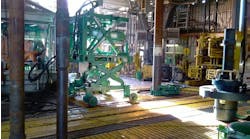Offshore staff
LONDON – Petroleum tax changes introduced by the UK government are stimulating fresh investment in Britain’s oil and gas sector.
According to Oil & Gas UK’s 2013 Activity Survey, companies are planning programs with a total value of almost £100 billion ($151 billion).
Last year’s new offshore projects on the UK continental shelf (UKCS) incurred total investments of £11.4 billion ($17.2 billion), the association adds, and it expects this year’s total to reach at least £13 billion ($19.7 billion).
Malcolm Webb, Oil & Gas UK’s chief executive, said: “After two disappointing years brought about by tax uncertainty and consequent low investment, the UKCS is now benefitting from record investment in new developments and in existing assets and infrastructure, the strongest for more than three decades.
“The recent introduction of targetedtax allowances to promote the development of a range of difficult projects, coupled with the government’s ground-breaking commitment to provide certainty on decommissioning tax relief, has prompted global companies and independent businesses alike to take another look at the UK as an investment destination and resulted in a new wave of investment. It is crucial that we sustain this momentum in the years ahead.”
Improvements in the tax regime have made more oil and gas reserves commercial for development. However, Oil & Gas UK points out that reserves moving into production are not being fully replaced with new discoveries.
“Only 21 exploration wells per year on average were drilled over the last three years,” Webb said. “As a result, in 2012 not enough barrels were discovered to replace all those produced. However, again, there is real cause for encouragement as the survey results lead us toforecast 130 exploration wells over the next three years which, alongside the use of new and improved subsurface technology, should result in many more barrels being discovered.”
Last year averageUK production fell to 1.55 MMboe, down 14% from the figure in 2011 and 30% from 2010. Much of the decline was down to investor confidence having been shaken by negative tax changes in the mid-2000s, the association claimed, with new developments reaching a low point in 2008/2009.
This year production may drop further to 1.45–1.5 MMboe/d, but an upturn is expected over the next three to four years, reaching 2 MMboe/d by 2017. Projects approved in 2011 and 2012 alone should over time produce more than 2 MMboe of oil and gas.
Webb concluded: “There has always been an over-riding case to maximize recovery of the UK’s oil and gas resources. It has never been more important or relevant that we do so than now. Seventy percent of British energy requirements will likely still need to be met by oil and gas into the 2040s. As a nation we need to satisfy as much of that demand as possible from our own resources.”
2/25/2013


